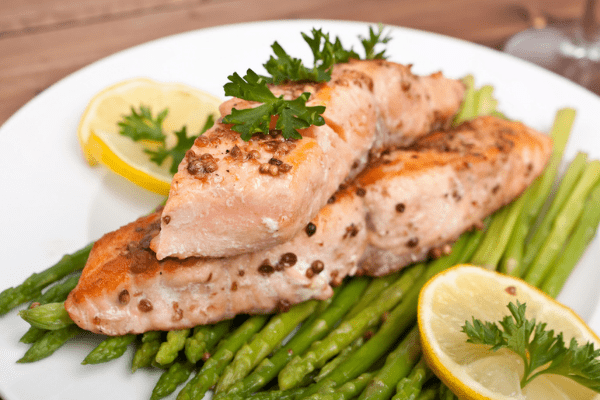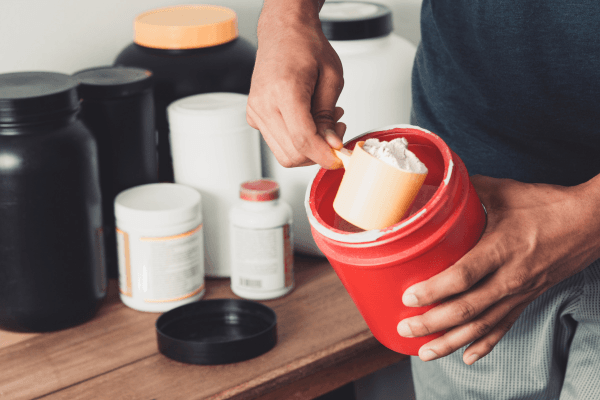During the month of Ramadan, it is important that you stick to a healthy meal plan. This means avoiding the consumption of fried foods such as samosas and pakoras and reducing your intake of salty foods.
Drinks like fruit juices, smoothies and fizzy drinks not only increase your calorie intake but can also leave you feeling hungrier throughout the day. During Ramadan, it is normal to feel hungrier in the first several days, but your body adjusts and gets used to the routine of fasting. It is important to maintain hydrated and try to consume 2-3 litres of water between sunset and sunrise.
Iftar inspiration for Ramadan
Iftar is the meal you eat when you break your fast and Suhoor is a pre-dawn meal consumed before sunrise.
At the opening of the fast, consume 2-3 dates with 2 glasses of water. Please see below for easy-to-prepare Iftar options:
- 1 large sized chicken breast in a marinade of tandoori spices, grilled and served with a small bowl of chickpeas salad and raita.
- 1 large sized chicken breast coated with spices, grilled and served with tomato salsa and couscous.
- Grilled fish fillet served with 2 cups steamed mix vegetables.
- A bowl of red lentil soup with high-protein three bean salad.
- 2 grilled tandoori chicken drumsticks with 1⁄2 cup cooked quinoa and raita.
Feel free to add your favourite chilli sauce but limit intake of other condiments such as ketchup and garlic or plain mayonnaise.
At the end of Iftar, if desired, drink a cup of preferred decaffeinated tea (mint, green, black) /coffee (this contributes toward fluid intake!).
Snack ideas for Ramadan
- 8 unsalted almonds.
- 2 tbsp Greek yoghurt with a small handful of blueberries.
- 1 apple, sliced into wedges with 1tsp peanut butter.
- 1 carrot, grated and mixed with rose water and 1 tsp desiccated carrot.
We have created a 7-day meal plan for you to use through Ramadan. Review the different options and mix-and-match the various Iftar/Suhoor options, as you desire!
Day 1:
Iftar: 2 dates. A large sized chicken breast in a marinade of tandoori spices, grilled and served with a small bowl of chickpeas salad and raita. One banana and 2 glasses of water.
Activity: 30 min brisk walk
Snacks: 6 unsalted almonds with decaffeinated green tea
Suhoor: 2 weetabix with semi-skimmed milk with a banana/apple and 2x glasses of water
Day 2:
Iftar: 2 dates. Chicken with 2 small whole-wheat chapattis (prepared without oil/ghee), followed by fruit salad and 2 glasses of water.
Activity: 30 min brisk walk
Snacks: 4 unsalted almonds with 8 sultanas and a decaffeinated green tea.
Suhoor: 2 brown seeded bread with low fat butter with a pear/apple and 2x glasses of water
Day 3:
Iftar: 2 dates. Grilled fish fillet served with 2 cups steamed mixed vegetables and 2 glasses of water.
Activity: 30 min brisk walk
Snacks: 2 tbsp greek yoghurt with a small handful of blueberries.
Suhoor: Banana, oat and chia porridge and 2x glasses of water.
Day 4:
Iftar: 2 dates. Chicken curry with boiled rice (2 tennis ball size portions) followed by bean-salad. 2 glasses of water.
Activity: 30 minutes brisk walk
Snacks: ½ carrot, sliced into batons, with 2 tbsp hummus
Suhoor: whole-wheat chapatti, prepared with no oil. 1 apple and 2x glasses of water
Day 5:
Iftar: 2 dates. Large bowl of red lentil soup with high-protein bean salad. 2 glasses of water.
Activity: 30 mins brisk walk
Snacks: rainbow salad
Suhoor: Date and walnut porridge. 2x glasses of water.
Day 6:
Iftar: 2 dates. Saag aloo and okra stew (spinach, sweet potato and okra). 2 glasses of water.
Activity: 30 mins brisk walk
Snacks: 6 strawberries
Suhoor: Persian-style salad (1 tomato, 4 walnuts, handful of mint leaves and parsley) served with thumb-sized portion of low-fat feta cheese.
Day 7:
Iftar: 2 dates. Small piece of beef steak with sweet potato and salad. 2 glasses of water.
Activity: 30 mins brisk walk
Snacks: small bowl of edamame beans with peas and mint sauce.
Suhoor: Veggie omelette (2 eggs) with 1 slice brown bread. 2x glasses of water
Chicken can be substituted with fish or lean lamb. All curries should be prepared using minimal oil. Fried foods such as pakoras and onion bhajis should be avoided as they contribute toward calorific intake and promote hunger and thirst when fasting. Sweet dishes such as mithai should be avoided and restricted to only rare occasions.
All activity should be gradually increased depending on your capability. Some people with medical problems should consult their doctor before embarking on any activity. Those who are already active can continue their exercise plan but at a reduced intensity to start with and gradually increasing in time and intensity based on how they can cope.
Simplyweight’s Specialist Online Weight Loss Plan has been designed to bring decades of clinical experience to people at an affordable price. To learn more, start your 7-day free trial today: https://app.simplyweight.in/subscribe/free-trial




